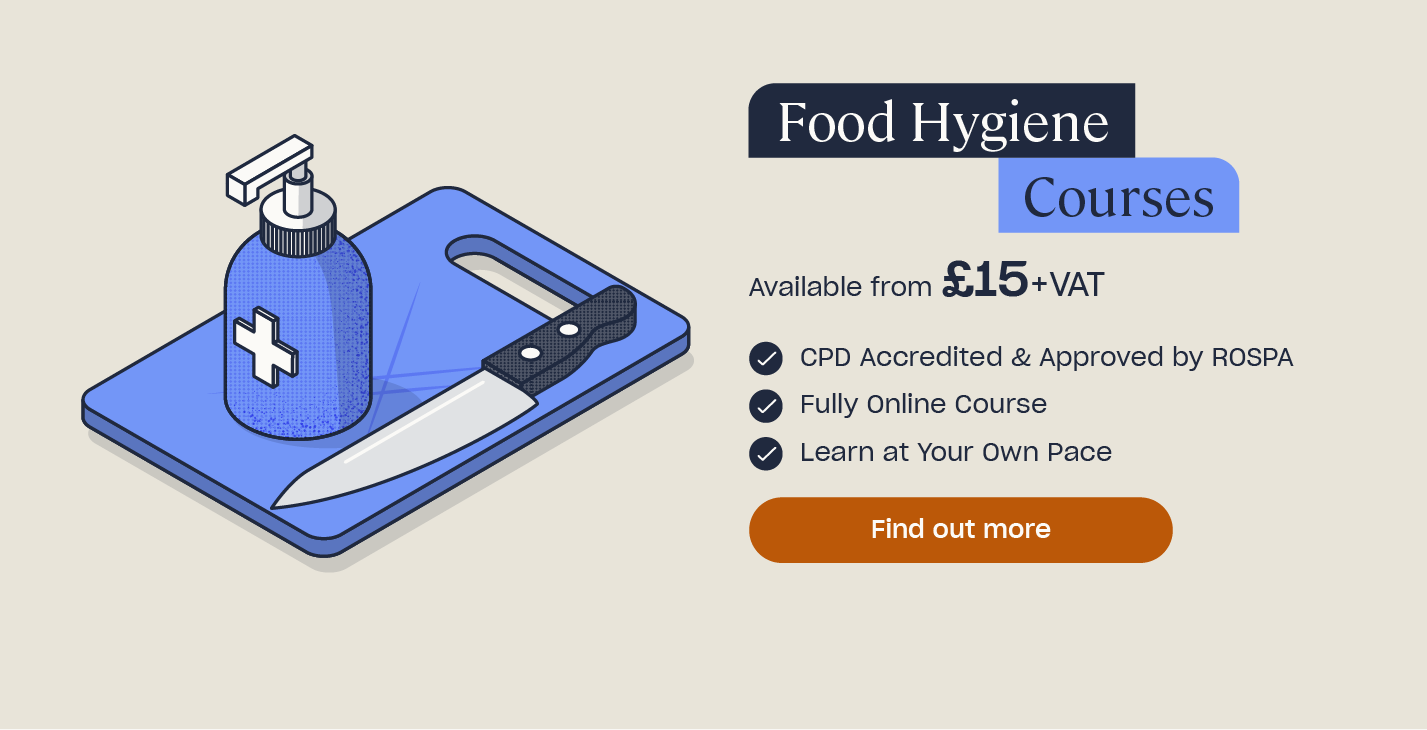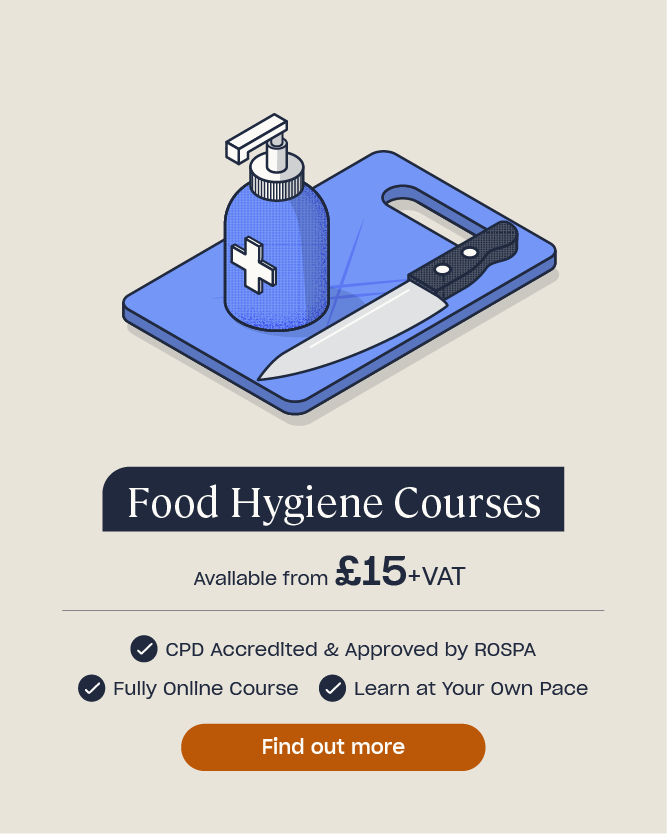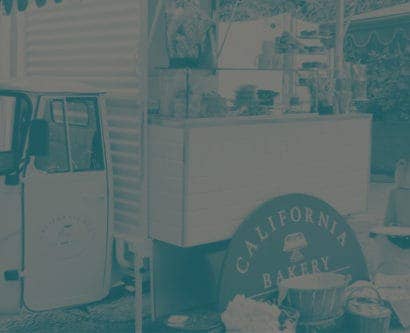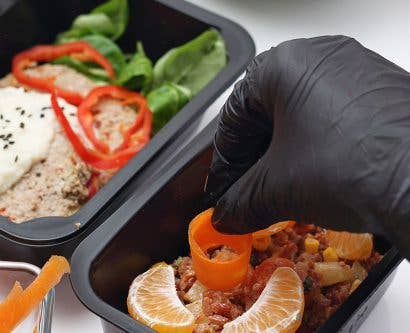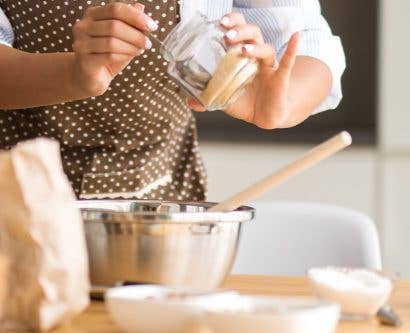Introduction
Perhaps your heritage gives your recipes an edge, or you are reinventing recipes your great-granny used to make but now with a twist. Maybe you have discovered a niche and are working on recipes with dietary restrictions. Whatever it is, you are now thinking about the possibility of starting your own food business from home.
Many people love the thought of doing something they enjoy and earning a living from it. With home food businesses, often people can feel they don’t have any professional experience or training, and it can be hard to know where to start.
Our guide will show you how to start selling your homecooked food to the public. It provides practical information that’ll help you ensure you are legally compliant, gives you the knowledge to operate best practice in your premises, and helps you get comfortable with spreading the word about your goods.
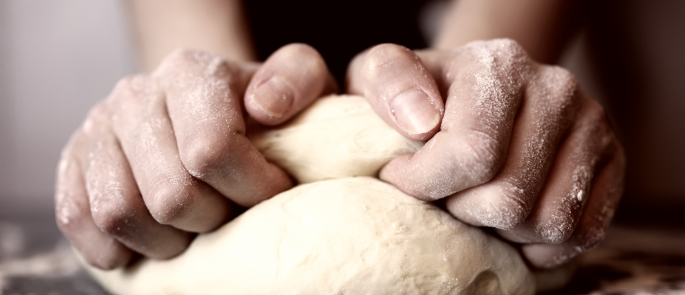

Want to learn more about successfully starting your own food business from home? We offer a range of online training courses and, whilst our Level 2 Food Hygiene and Safety for Catering course will cover your hygiene requirements, our Starting a Home Food Business course goes into depth about everything included in this article and more.
 Why Should You Start a Food Business From Home?
Why Should You Start a Food Business From Home?
Starting a business from home can be daunting, but there are numerous positive aspects to getting going. You don’t need to have any work experience or background in retail or manufacturing products. You don’t even have to be a marketing guru, or have a business degree – there is help out there for everyone!
The number one ingredient you must have is a passion for your product. Making your offering the best you can will speak volumes when you come to selling your homecooked food to the public. If you’re still not sure this is the right venture for you, we’ve compiled a list of reasons why a food from home business can be an attractive option. For inspiration, we’ve also included some success stories below:
-
Low cost
Most people develop food businesses at home because they are already creating their product there. This means that when they want to get started with their business, they generally already have most of the equipment and the knowledge they need.
Spice Kitchen was set up in 2013 by a mother and son team. It was begun without any investment or loans, and has never sought any since. When starting up, you will need to make sure you have capital to cover immediate key expenses, such as ingredients, equipment, packaging, labelling and potentially distribution. You may need some help with accounts and tax returns, so bear that in mind.
-
The ability to be creative in your job
What you produce is entirely up to you and your passion – you can make whatever you want and market it any style you wish to. Just make sure you research your intended audience, so you know it will be well received.
Higgidy Pies were deliberately marketed to women. The first flavours they did had great feedback, such as their Beef, Stilton and Ale pie, but there were many comments asking for smaller and lighter dishes. In response, Higgidy developed a range of vegetarian quiches and tarts. These are now a huge part of the business.

-
A simple business model to follow
In business terms, the concept of making something and selling it is very straightforward, which is probably why starting a food business appeals to so many.
The husband and wife team, Camilla and Nick, who started Rude Health didn’t have a business plan when they first set out. Having studied Japanese at university and enjoyed a career in Marketing, Camilla soon realised she needed to devote her full attention to Rude Health. They had great support from Nigella Lawson, Abel & Cole and Riverford organic vegetable box schemes. They are now also stocked in Waitrose and Tesco.
-
The ability to create your own working schedule
There’s no doubt that starting a business from scratch requires huge effort, and you will likely want to be working 7 days a week, every hour of the day. But that will be your choice, there is no one to tell you when you should work.
From Dorset With Love began in 2010 while Chrissy was on maternity leave. She started it as a hobby and went back to work when her maternity leave ended. Her passion for preserving never wavered and in their first year, two products attracted 1 Gold Star and 2 Gold Stars from the Great Taste Awards. Inspired to continue, Chrissy now works full time on the business, with her husband Karl, their two sons, and a family friend helping with design and ad-hoc production in their spare time.
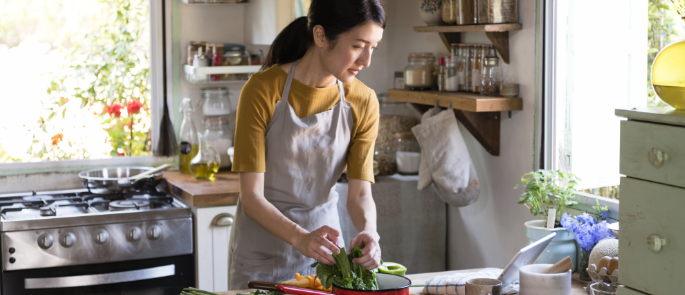
-
Diversification opportunities once the business takes off
The business could have unlimited potential, depending on which route you want to take. You have the freedom to choose your own path.
Yorkshire Provender was originally founded as The Yorkshire Party Company, where they catered mainly summer, private events. In order to develop income year-round, Belinda began experimenting with homemade soups in 2004, and Yorkshire Provender was born. Recognising that the soups had more potential allowed her to grow and develop the range. Yorkshire Provender is now available in Sainsbury’s, Booths, Waitrose and other independent shops.
-
The business can be run from home
This is a huge plus for many people. Being able to work around other commitments, and having no additional overheads if things don’t work out, can ease the pressure on you to make your fledgling business a quick success. However, it can make the start of your home business difficult to manage, especially when there are boxes and products all over the house!
Debbie & Andrew’s Sausages. When Debbie and Andrew lost their herd of pigs, they had to be creative and think of something else to provide for them and their family. As they already knew how to make sausages, it seemed like a logical step to take. They began making sausages and wrapping them by hand, at the kitchen table, and selling them to the local pub. Now they have stock in supermarkets up and down the country.
-
You can create healthy products with minimal ingredients
Many people start creating food at home to satisfy a need they have, be it honest food without preservatives and ingredients you can’t pronounce, or an allergy that has you reaching for free-from recipes. Knowing what is in the food you eat is a real concern to consumers, so you may have discovered a niche in which you can satisfy a growing demand.
This is what happened with Proper Nutty. On returning from living abroad in 2012, Stuart and Kathryn realised they couldn’t get hold of any good quality peanut butter, that wasn’t full of additives, so they started to make their own. Quickly they moved from their kitchen table to a small factory in Dewsbury, installed a roaster and grinder imported from Italy and began producing on a big scale. They only have two products: “Nowt but Nuts” is 100% peanuts and “Slightly Salted” which only contains peanuts and 0.5% natural sea salt, and that’s it. Now, they supply shops around the country, including big supermarkets.

What Do I Need to Start My Home-Based Food Business?
There are certain legal requirements you will need to meet when setting up a food business from home. Use the drop downs below to go through each stage. Our helpful step by step guide will get you ready to begin your business.
Creating A Business Plan
Having a business plan is really important as it makes you think about what you want your business to be, where you see it going, and what you want to achieve from it. Whether you want to start a catering business from your home, a decorative cake company, or anything else in between, it will help you set out your objectives for your home-based food business. It will also help you to prioritise your next steps.

There are a number of things to consider when planning your business, so we’ve asked the key questions below to get you thinking:
- Who is your target market? Do you have a niche market in mind, or have you discovered an old family recipe you feel modern day consumers would love? Understanding your target market will help you focus your brand. This will influence how you market your product and interact with your customers. For example, with the rise of milk or lactose allergens, maybe you are making a range of hot chocolates using milk alternatives – who would buy these? What else do they buy, where would you find them shopping for other goods, could you use social media such as Instagram to reach out to these consumers?
- Do you have a unique selling point? Why do you think people will love your product? Consumers love a back story – they want to know where your inspiration and love for your product comes from. Having this in mind will come across in your product design, and it will help you sell too.
- Where do you want to sell your home-baked goods? If you are looking to sell your product at local markets, research into the best places near you, keeping in mind your target audience. For example, cakes and sweet treats could sell well at craft fairs, as well as at farmers markets.
- How do you want to sell your food? Have you considered selling online? eBay, Facebook and Amazon Pantry can be great platforms for getting your goods out.
- Will you be delivering items yourself, posting or using a courier? Factor in the time spent delivering, as well as the monetary cost.
- Will you make to order? Or could you batch make your product in bulk and keep some in reserve? Making to order could reduce waste on products with a short life, while bulk batching could keep profit margins high, but it would require a bigger initial spend for ingredients and possibly packaging and storage.
- How are you going to know if your product is liked? There are potential product testers everywhere, you could use your friends and neighbours for initial feedback but the real test is how paying customers like it. Approach some local cafés, delis or shops to see if they would take some goods in return for some feedback.
- How much start-up capital do you need? For example, when starting a mobile catering business, you may need to buy or renovate a food truck. If you do need to ask for a loan, having a good business plan will help your chances of approval.
Remember: Play to your strengths. If you have an eye for detail, and patience to create intricate cake designs, focus on niche markets like wedding cakes. Even if you have better contacts in other markets, you can research your chosen market, develop your knowledge and make new contacts.
You may want to look at our Starting a Business Course for essential start up topics. We have also provided a one page business plan template, which provides you with a great place to get thinking and start your business plan.
When you’ve written your business plan, you are ready to move onto the next step!

Registering Your Home Food Business and Setting Up as a Sole Trader
Once you have a working business plan, you will need to register your business from home, before you can go on to sell your home-cooked foods to the public.
You should register your business with your local authority at least 28 days before opening. Registration of your food business is free and can’t be refused. If you are already trading and have not registered, you need to do so as soon as possible.
Anyone who serves customers directly in food operations will need to register. According to the Food Standards Agency, food operations includes:
- Selling food.
- Cooking food.
- Storing or handling food.
- Preparing food.
- Distributing food.
Furthermore, you must register every premises where you carry out food operations, such as your home, mobile catering units (i.e. food vans), and temporary premises (i.e. food stalls).
‘If you make, prepare or handle food that comes from animals, for example meat or dairy products, other than for direct sale to the consumer, your premises may need to be approved by the council before you can undertake the activity.’
An example of this would be making meat pies and selling them to a restaurant, who would then sell them onto the consumer. If you think this may apply to your business, you can check the section on the government website for Food Premises Approval. Alternatively, register your business first, and apply for approval if your local authority then requires you to do so.
When starting your business from home, you should check if you need permission from your mortgage provider, or landlord. Remember to check your home insurance policy, as you may need to take out a separate policy to cover your business.
You will also need to set up as a sole trader with HMRC. You are classed as a sole trader if you run your own business as an individual and are self-employed. Once you’ve done this you will need to file a Self Assessment Tax Return annually, so keep a record of all your business’s sales and expenses. There is a helpful calculator on the HMRC website to help you factor this cost into your plans.
If your business turns over more than £85,000 annually, you must also register your business for VAT. You can register voluntarily if your turnover is less than £85,000. Some businesses will do this if they buy or sell products with other VAT registered businesses and want to claim the VAT back.
Most food and drink from caterers and take-away services are zero rated, but there are some exceptions. To find more about which products you need to charge VAT on, check the VAT notice on the gov.uk website.
If you run a food business without registering, you may be fined, and you could be imprisoned for up to 2 years.
Once you have submitted your registration with your local authority, you can begin trading. You may receive a visit from the Environmental Health Office (EHO), usually within 28 days from submitting your completed registration form. The EHO will also check to ensure you are compliant with all the relevant food hygiene legislation.

Getting Your Food Premises Ready for Approval
There are several things you need to do to make sure your home is fit for purpose. These are:
- Preparing for an EHO visit
- Completing the legally required food hygiene training.
- Understanding and implementing your due diligence and HACCP requirements.
- Understanding the regulations around food allergens and food labelling, and implementing these where necessary.
- A practical assessment of your working environment
1. When you receive a visit from the EHO, the inspectors will give your business a Food Hygiene Rating. You will probably recognise the sticker they award as every food premises has one, from your local cafe to your favourite butcher’s shop.
You can view our full report on food hygiene scores, and find out how your hometown compares to others here: Food Hygiene: Know the Score.
When checking your food premises for approval and issuing your Food Hygiene Rating, EHO inspectors will assess three areas of your home business:
- Hygienic food handling – Checking the safe preparation, cooking and storage of food. They will also look at if and how you cool and/or reheat your product.
- Physical condition of the premises and facilities – Whether your home is appropriate for your needs, if you have a high standard of cleanliness, suitable ventilation, and pest control measures in place.
- Food safety management – Evidence that you take food safety precautions seriously, such as having a HACCP (Hazard Analysis and Critical Control Points) system in place and following those procedures.
2. To make sure you are compliant with these areas, anyone working with food in your business will need training to an appropriate level. In order to be prepared for the visit, get yourself up to speed with the relevant training. Training can be done quickly and easily online with our compliance courses. In particular, our Level 2 Food Hygiene Course For Catering takes just 2 hours to complete, it will make you legally compliant with all the above, and will teach you best practice of work.
3. There are a number of other online training courses you can take, as it is crucial that you understand risk and where it could occur in your business. If you do ever face a food safety issue, having due diligence records is the primary legal defence accepted under the Food Safety Act 1990. Due diligence in food safety means being able to prove that your business has done everything reasonably possible to prevent food safety breaches. Following and recording a suitable HACCP system is an effective way to evidence this – our Level 2 HACCP Training Course will give you knowledge on safe food management practice.

4. Another very important part to consider for your home business is food labelling. Any pre-packed foods must be labelled and there is mandatory information you will need to include on your labels. Non-prepacked foods do not require labels, but businesses must be able to provide allergen and intolerance information to customers. You may want to consider our Food Allergen Awareness Training Course to learn about how to control the risk of allergens.

All of the training we provide has been written by industry experts, and is instantly accessible online from any device. Furthermore, our courses take a matter of hours to complete and you can download your certificate immediately upon completion of the course. We also post a hard copy at no extra cost, should you want to frame one for your business. In addition, we have many useful articles and free resources here on the Hub, such as this free download where you can print your own food allergen labels.

5. Practically, you will need to make sure your kitchen is safe for you to work in. As a registered business, you will need to meet certain health and safety requirements. If you have 5 or more employees, you will need to have a written health and safety policy. All businesses are legally required to implement and maintain sufficient fire safety measures, so you will need to carry out a fire risk assessment. You should also consider your first aid arrangements, as the Health and Safety (First-Aid) Regulations 1981 (as amended) require all employers to provide adequate and appropriate first aid equipment.
Being prepared and knowledgeable about food hygiene, safety systems, allergens and labelling is the best way to ensure your home food business is legally compliant. It shows that you have relevant knowledge and that your customers can have confidence in your product. To help with this, we have developed a food hygiene inspection checklist, which you can download for free.

How to Spread the Word About Your New Food From Home Business
Social media is perhaps the easiest way to get your brand out there, and best of all, it’s free! Use social media tools like Instagram, Facebook and Twitter to get the word out. Taking pictures of your creations and becoming a personality that people follow will get them invested in your product. Make sure you sign up for one of each account in your business name, and add it into your business planning stage.
Go and introduce yourself to local businesses who may be interested in your product. Be prepared with sample stock and know your business plan back to front. If they are keen, they may ask you about prices, so research similar products and have a price in mind. Think also about your ability to deliver the product regularly, and try not to overcommit.

You may want to trial different approaches and see what works best for you and your business. Whichever way you choose, remember that your customers are buying into you as much as your product. Your customer service will be what brings people back to you time and time again, so value each sale. Knowing their custom is valued will generate a positive experience and a happy memory for each person who buys your product.
Starting a food business can be a complicated and daunting process. There is a lot to consider, and do, before you even start producing your food from home.
Food businesses can take years to establish and will likely develop naturally over time. It is possible your product will also evolve as you hone your own skills, and as you receive feedback from your customers. Don’t be afraid of trial and error when it comes to branding, packaging and marketing; many well-known products have undergone marketing transformations over the years.

Useful Resources:
- HACCP Information
- Food Standards Agency, Registering a Food business
- Safer Food Better Business – for England and Wales
- Safe Catering – for Northern Ireland
- Cook Safe – for Scotland
- Guidance on Food Labelling
- HM Revenue & Customs – www.hmrc.gov.ukNew employers’ helpline 0845 607 0143Helpline for newly self-employed people 0845 915 4515VAT registration 0845 010 9000
- Health and Safety Executive – www.hse.gov.uk
Afterword
We hope you find this guide useful as a beginner’s step by step checklist of how to start your own food business. To learn more about starting a food business from home, click through any of the links highlighted in this guide. You can also use the ‘Contact’ section of the High Speed Training website where we’ll be able to aid you further with the online training courses that we provide.
We wish you the best of luck with your business!

